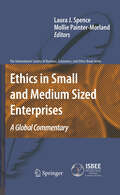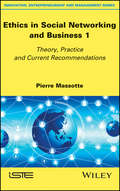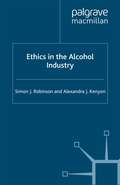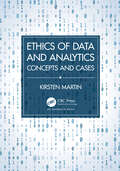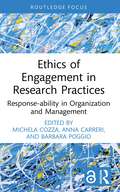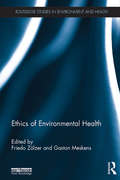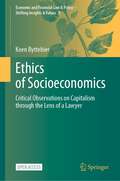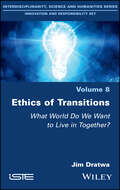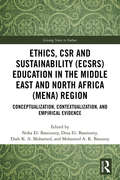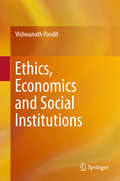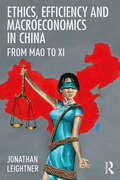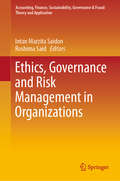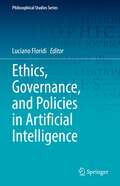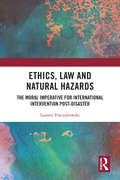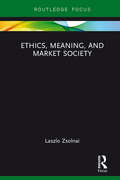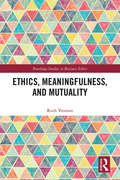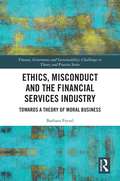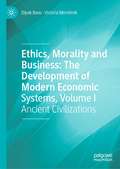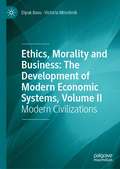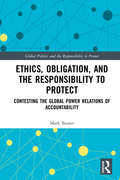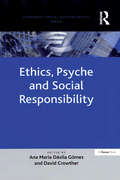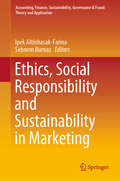- Table View
- List View
Ethics in Small and Medium Sized Enterprises
by Mollie Painter-Morland Laura SpenceThis book is the first of its kind - a global overview of extant research on ethics in small and medium sized enterprises. While vast amounts of corporate money, government policy and media time are directed at the social and ethical activities of large corporations, small businesses don't generally attract the spotlight. This is wildly inappropriate, however, since upward of 90% of private businesses are small or medium sized. This book goes some way to helping us understand the social and ethical contribution of this majority organizational form. The first section of the book is a global round-up of research on ethics in small and medium sized enterprises from major regions of the world. In the second section smaller scale research projects from a variety of countries present both empirical and theoretical advances in the area. Anyone with an interest in ethics and small and medium sized enterprises should find this an inspiring book which paves the way for future research.
Ethics in Social Networking and Business 1: Theory, Practice and Current Recommendations
by Pierre MassotteThis book, the first of two volumes dedicated to ethics in social networking and business, presents the notions, theories and practical aspects related to ethics, morale and deontology in our society. Through a series of discussions and examples on topics ranging from complexity to evolution theories, the author provides an insight into why business ethics is essential for managing risks and uncertainties. The Ethics in Social Networking and Business series is the result of a cross-integration of real experiences (from IBM, society and the Rotary Club), transdisciplinary works in decision making, and advances at the boundaries of several scientific fields.
Ethics in the Alcohol Industry
by Simon J. Robinson Alexandra J. KenyonA close look at the ethical and social responsibilities of the alcohol industry in the 21st Century. It begins with a whistle stop tour of the historical developments of alcohol. It then critiques the legislative and voluntary codes surrounding the advertising industry, popular culture, religious groups, Government and local authorities.
Ethics of Data and Analytics: Concepts and Cases
by Kirsten MartinThe ethics of data and analytics, in many ways, is no different than any endeavor to find the "right" answer. When a business chooses a supplier, funds a new product, or hires an employee, managers are making decisions with moral implications. The decisions in business, like all decisions, have a moral component in that people can benefit or be harmed, rules are followed or broken, people are treated fairly or not, and rights are enabled or diminished. However, data analytics introduces wrinkles or moral hurdles in how to think about ethics. Questions of accountability, privacy, surveillance, bias, and power stretch standard tools to examine whether a decision is good, ethical, or just. Dealing with these questions requires different frameworks to understand what is wrong and what could be better. Ethics of Data and Analytics: Concepts and Cases does not search for a new, different answer or to ban all technology in favor of human decision-making. The text takes a more skeptical, ironic approach to current answers and concepts while identifying and having solidarity with others. Applying this to the endeavor to understand the ethics of data and analytics, the text emphasizes finding multiple ethical approaches as ways to engage with current problems to find better solutions rather than prioritizing one set of concepts or theories. The book works through cases to understand those marginalized by data analytics programs as well as those empowered by them. Three themes run throughout the book. First, data analytics programs are value-laden in that technologies create moral consequences, reinforce or undercut ethical principles, and enable or diminish rights and dignity. This places an additional focus on the role of developers in their incorporation of values in the design of data analytics programs. Second, design is critical. In the majority of the cases examined, the purpose is to improve the design and development of data analytics programs. Third, data analytics, artificial intelligence, and machine learning are about power. The discussion of power—who has it, who gets to keep it, and who is marginalized—weaves throughout the chapters, theories, and cases. In discussing ethical frameworks, the text focuses on critical theories that question power structures and default assumptions and seek to emancipate the marginalized.
Ethics of Engagement in Research Practices: Response-ability in Organization and Management (Routledge Focus on Women Writers in Organization Studies)
by Michela Cozza Anna Carreri Poggio BarbaraThis book elaborates on the concept of response-ability. Although the notion is becoming popular in organization and management studies to talk about the ethical dimension of academic practices and research work, it has been formulated outside this discipline with Joan Tronto, Donna Haraway, Vinciane Despret, and Karen Barad as key authors. This book honors the foundational contribution of these scholars and their legacy.This book adopts a feminist posthumanist definition of response-ability as an iterative and emergent process that unfolds within embodied relations and through academic practices. A response-able academic practice intertwines personal reflexivity and critical analysis of the politics underlying our ways of knowing and doing in academia. Furthermore, a response-able approach requires us, as researchers, to pay attention to the consequences of our research practices through which multiple encounters are made possible (or impossible).By offering empirical examples and theoretical elaborations, this book invites students, researchers, and practitioners to find ways of embodying response-ability when generating knowledge.
Ethics of Environmental Health (Routledge Studies in Environment and Health)
by Friedo Zölzer Gaston MeskensEnvironmental health encompasses the assessment and control of those environmental factors that can potentially affect human health, such as radiation, toxic chemicals and other hazardous agents. It is often assumed that the assessment part is just a matter of scientific research, and the control part a matter of implementing standards which unambiguously follow from that research. But it is less commonly understood that environmental health also requires addressing questions of an ethical nature. How can we determine the "acceptable" risk level for the general population or for certain groups? How should we deal with uneven distributions of risks and benefits? How do we communicate about risks with the stakeholders? This multidisciplinary collection brings together a number of leading researchers and scholars in order to generate discussion surrounding these key questions, and to bring the ethical implications of science and technology to the forefront of critical thought. Providing a broad overview of the Ethics of Environmental Health, its philosophical foundations and practical applications, this book offers a significant contribution to ongoing discussions in sustainable development and will be of interest to scholars and practitioners of Environmental Health, urban studies and healthcare.
Ethics of Power, Influence, and Persuasion: Points to Honor
by Richard LueckePower is essential to the functioning of organizations and society, but it can also be used to corrupt. This chapter explains how managers can create a culture of ethical behavior that is self-policing and self-perpetuating and that sets a high standard for all employees.
Ethics of Socioeconomics: Critical Observations on Capitalism through the Lens of a Lawyer (Economic and Financial Law & Policy – Shifting Insights & Values #8)
by Koen ByttebierThe book analyzes socioeconomic through the lens of a lawyer. In the past decade the world has witnessed some severe financial and economic crises, especially the financial crisis of 2007-2008 and the crisis caused by the COVID-19 pandemic. The author states that the socio-economic order has in the past four to five decades been thoroughly redesigned, generally favouring models that prioritize the free market over the public interest or even, more generally, government operation. He works out that during four to five decades, globalized, capitalist societies are facing a multiplicity of fundamental problems, such as: (1) increasing debt that severely burdens both the private and public sectors; (2) persistent poverty and an ever-increasing polarization between rich and poor, in addition to (3) intractable environmental problems that, fifty years after the Club of Rome's report entitled ‘Limits to growth’ (1972), has dragged the world into what in recent years has been referred to as "climate change."The book explains why all this is the direct result of value choices made from the late Middle Ages onwards, when in the Western world the societal models of that time were increasingly abandoned for a societal model that came to rely on the primacy of economic interests. The book not only subjects the ethical choices but also examines various problems it has caused and probes for possible ways out.This is an open access book.
Ethics of Transitions: What World Do We Want to Live in Together?
by Jim DratwaThis book covers all forms of ethical assessment of research and innovation at the European Commission, including the implications of the concept of RRI which has emerged as a new framework to be used by the European Commission, and indeed including the newer concepts of Open Innovation and Open Science which are designed to subsume and reconfigure RRI. The book can be used as a &‘how to&’ guide to understand and navigate the ethical and societal demands in developing European research projects; it also pushes the reflection and reflexivity further, bringing provoking new (and also some very old) perspectives to bear on ardent debates in studies of expertise, ethics and policy making.
Ethics, CSR and Sustainability: Conceptualization, Contextualization, and Empirical Evidence (Giving Voice to Values)
by Noha El-Bassiouny Dina El-Bassiouny Ehab K. A. Mohamed Mohamed A. K. BasuonyThe Middle East and North Africa (MENA) region is undergoing significant socio-political and developmental transition. Although interest in corporate social responsibility (CSR) in the region is growing, little research has addressed corporate social responsibility education and its potential impact. CSR has an important role to play in the socio-economic development of the Middle East and North Africa due to the volatility and developmental needs of the region. Recent research has highlighted that the vitality of the institutional environment and the needs of multiple stakeholders in CSR are not necessarily consistent with the notion of CSR in the West. This book compiles conceptual, contextual, and empirical research that addresses the concepts of CSR, ethics, and sustainability education in the MENA region, with a special emphasis on how educators can bridge to the Giving Voice to Values approach. This book presents a much-needed portfolio of articles from authors based in Egypt, Morocco, the Sultanate of Oman, Qatar, and the United Arab Emirates (UAE), highlighting first an overview of the topic and its corresponding publications in the MENA region, then presenting several exemplary cases related to ECSRS application in various countries.
Ethics, Economics and Social Institutions
by Vishwanath PanditThe book highlights the ethical aspects and issues that are inherent to economics in the context of today's prominent social institutions. It reviews a range of problems concerning dominant social institutions, namely markets, government agencies, corporate entities, financial networks, and religious systems. Further, in each case, the book takes a detailed look at the economic problems as they arise within a broader sociological and political environment, taking into account the respective ethical/philosophical paradigms. It analyzes from an ethical point of view topics like the evolution of economic thought, happiness and spirituality, and human values in relation to ethics.
Ethics, Efficiency and Macroeconomics in China: From Mao to Xi
by Jonathan LeightnerThis book tells the story of how China’s leaders, from Mao to Xi, have sacrificed ethics to promote either macroeconomic performance or microeconomic efficiency. This story includes Mao’s collectivization of land, the Great Leap Forward, the Great Cultural Revolution, Deng’s opening China to international trade, Tiananmen Square, the freeing of prices, food and medicine scandals, the 2015 surge and collapse of the Chinese stock market, the falling of China’s foreign reserves, and so on. In 2008, China’s leaders correctly identified the best strategy as a "consumption-driven growth strategy" because the current world is suffering from a glut of savings. However, for that strategy to work, the Chinese need to be able to trust China’s economy and leaders. In the absence of trust, people will make decisions based on extremely short time frames which will hurt China’s long-run potential and continue to generate a series of speculative bubbles. In the absence of trust, wealthy Chinese will continue to move their assets abroad, putting tremendous downward pressure on the Chinese yuan. The Chinese will develop a long-run perspective and invest in China only when they can trust China’s future. In today’s world, trust is necessary. Trust is built on ethics.
Ethics, Governance and Risk Management in Organizations (Accounting, Finance, Sustainability, Governance & Fraud: Theory and Application)
by Roshima Said Intan Marzita SaidonThis book brings together research works, ideas, critical reviews and strategic proposals encompassing various ethical and corporate governance issues in workplaces and organizations around the globe. For the most part, organizations are managed by policies, guidelines and systems. Good ethics and solid corporate governance help to tie these three elements together so that an effective and successful organization is established. Alongside corporate governance, ethics play an integral role in ensuring the long term survival of businesses. Multidisciplinary in approach, this book provides a platform for scholars and researchers from various backgrounds and interdisciplinary expertise to showcase their research work, ideas, critical review and strategic proposals on the ethical aspects, governance and risk management issues in organizations. The book includes discussions of ethical issues in a variety of organizations around the globe including the non-profit and non-governmental sector and also provides readers with ideas, guidelines and strategic recommendations for handling such issues.
Ethics, Governance, and Policies in Artificial Intelligence (Philosophical Studies Series #144)
by Luciano FloridiThis book offers a synthesis of investigations on the ethics, governance and policies affecting the design, development and deployment of artificial intelligence (AI). Each chapter can be read independently, but the overall structure of the book provides a complementary and detailed understanding of some of the most pressing issues brought about by AI and digital innovation. Given its modular nature, it is a text suitable for readers who wish to gain a reliable orientation about the ethics of AI and for experts who wish to know more about specific areas of the current debate.
Ethics, Law and Natural Hazards: The Moral Imperative for International Intervention Post-Disaster
by Lauren TraczykowskiThis book argues that the international community has a moral duty to intervene on behalf of a population affected by a natural hazard when their government is either unable or unwilling to provide basic, life-saving assistance. The work draws on law, international relations theory, and political philosophy to articulate that non-response to a natural hazard is unethical. In providing policy suggestions the author articulates what should happen based on an ethical analysis. Readers will thus gain an ethical lens with which to view intervention in the aftermath of a natural hazard. The book encourages readers to consider the nuances of arguments from various disciplines about whether or not intervention is appropriate. Whilst arguing throughout that an intervention policy in response to natural hazards should be developed by the international community, the study also accounts for why intervention should only be used in very limited situations. This interdisciplinary approach makes the book essential reading for researchers, academics and policy-makers working in the areas of international law, humanitarian studies, human rights, international relations and political science.
Ethics, Meaning, and Market Society (Routledge Focus on Business and Management)
by Laszlo ZsolnaiThis book explores the underlying causes of the pervasive dominance of ‘unethics’ in contemporary affairs in economics, business, and society. It is argued that the state of unethics is related to the overexpansion of market and market values in all spheres of social life and human activities. A correlate of this development is the emergence of an extremely individualistic, materialistic and narcissistic mind-set that dictates the decisions and behavior of people and organizations. The author argues that art can help to overcome the dominant market metaphysics of our age, as genuine art creates models of 'poetic dwelling,' which can generate non-linear, progressive change that opens up a larger playing field for ethics. Aesthetics and ethics go hand in hand. Ethical action is not just right for its own sake, but makes the world a richer, livable and more beautiful place. Ethics, Meaning, and Market Society will be of interest to students at an advanced level, academics, researchers and professionals. It addresses the topics with regard to ethics in economics, business, and society in a contemporary context.
Ethics, Meaningfulness, and Mutuality (Routledge Studies in Business Ethics)
by Ruth YeomanThere is an urgent need to understand how private and public organisations can play a role in promoting human values such as fairness, dignity, respect and care. Globalisation, technological advance and climate change are changing work, organisations and systems in ways which foster inequality, alienation and collective risk. Against this backdrop, organisations are being urged to make their contribution to the common good, take account of the interests of multiple stakeholders, and respond ethically as well as efficiently to complex challenges which transcend traditional organisational and state boundaries. Ethics, Meaningfulness, and Mutuality poses critical questions related to organisational design by challenging limits to current thinking, such as the neglect by political philosophers of markets, firms and stakeholders, or by organisational theorists of business ethics. In so doing, the book advances our understanding of the theory and practice of ethical organising. Specifically, meaningfulness and mutuality will be used to yield values and principles for a philosophy of ethical organising which includes an account of human values in morally desirable collective action, and examines the relationship of collective action to the contested concept of shared value creation. Within a philosophy of ethical organising, mutuality permits an examination of the unavoidable relational nature of collective action, whereas meaningfulness addresses fundamental human concerns for significance and leading a life we have reason to value. By addressing our status as relational beings with human needs for meaning, a philosophy of ethical organising brings critical thinking to the creation of morally informed organisational practices which are not only instrumentally beneficial for addressing wicked problems, but are normatively desirable for human flourishing.
Ethics, Misconduct and the Financial Services Industry: Towards a Theory of Moral Business (Finance, Governance and Sustainability)
by Barbara FryzelThis book explores how ethics and the moral context of business have evolved historically in inf luential management theories and concepts. It looks at how managerial thought accommodates morality, values, and ethics and demonstrates the emerging patterns of ethical conduct to illustrate how moral aspects of management and organizational practice can become peripheral. The author examines a diverse range of data sources such as the most seminal books in management and academic papers published in the mainstream academic literature. The readings selected in the process are subject to critical analysis and are complemented by an exploratory study of the financial services industry, based on semistructured in-depth interviews. The uniqueness of the proposed approach comes first from the consolidation of many perspectives such as management, organization studies, and business anthropology rather than focusing on one particular subdiscipline; second, from using a mixed methodology, combining literature reviews with empirical, exploratory research based on interviews; and third from including a narrative context in the analysis and proposed future theory framework. This book will appeal to students, researchers, and scholars who teach ethics in the fields of economics or business. It is useful for advancing theory and research on moral management and as a resource for management practitioners looking to create business practices fostering moral sensitivity. Those interested in setting future development directions may also find the proposed consolidation of theoretical and empirical evidence valuable for the design of future policies.
Ethics, Money and Sport: This Sporting Mammon (Ethics and Sport)
by Richard Giulianotti Adrian WalshWritten from the contrasting yet complementary perspectives of sociology and philosophy, this book explores the far-reaching ethical consequences of the runaway commodification of sport, focusing on those instances where commodification gives rise to morally undesirable consequences. The authors consider three main areas of concern for participators and observers alike: the corrosion of the core meanings and values of sport, the increasing elitism of access to sporting commodities, and the undermining of social conditions that support sporting communities. Unique in its focus on the ethical dimension of the powerful economics of today’s sport, this book will be of interest, not only to those in the fields of sports studies and ethics of sport, but also to academics, researchers and students in philosophy of morality, sociology, and the ethics of globalization as viewed through the ultimate globalized phenomenon of modern sport.
Ethics, Morality and Business: Ancient Civilizations
by Dipak Basu Victoria MiroshnikThis book, the first of two volumes, examines ancient civilizations to explore the ethical foundations of modern economic systems. The origin of ethical values is analyzed from a historical context and, through investigating the spread of the Aryan civilization from India into the rest of the world, the links between ancient Russia, India, Japan, and Greece are highlighted. By examining the business management in these societies, the development of an ethical system is explained.This book aims to highlight how trust is fundamental to transactions within an exchange economy. It will be relevant to those interested in economics, development studies, international relations, and global politics.
Ethics, Morality and Business: Modern Civilizations
by Dipak Basu Victoria MiroshnikThis book, the second of two volumes, is inspired by the famous philosopher of India, Kautilya, author of the first book on economics in the world, Arthashashtra. It analyzes the influence of ethical values from ancient societies on modern systems of management and economics. While this book deals with the “global sages” like Aristotle, Buddha, Jesus, the scope is also expanded to incorporate other notable modern thinkers like Karl Marx, Adam Smith, and Rabindranath Tagore. This book aims to highlight the interrelationships between ethics and management, both from a micro and macroeconomics, as well as organizational and national, perspective. It will be useful for those interested in history, economics, development studies, international relations, and global politics.
Ethics, Obligation, and the Responsibility to Protect: Contesting the Global Power Relations of Accountability (Global Politics and the Responsibility to Protect)
by Mark BusserThis book critically examines arguments about ‘obligation’ and ‘responsibility’ in relation to the responsibility to protect (R2P) and situates it within wider moral argumentation concerning the role of culpability, answerability, and human rights in international affairs. It discusses the ways in which R2P has been imagined and contested in order to illuminate some possible trajectories through which its potential might be actualized. Crucial to the development of a more ‘responsible’ world politics will be the recognition that formal inter-state ‘regimes’ of responsibility will need to be embedded within wider social ‘fields’ of responsibility constituted by the participation of attentive and mobilized global citizens ready to hold elites accountable. This book provides novel ideas to better understand the role of rhetoric and moral argumentation in international relations. Much of the novel contribution comes in the form of its conceptual breakdown of the ambiguous concept of ‘responsibility,' which often clouds clear understanding not only in international relations, but also in the specific debates over the ethics and practice of the international responsibility to protect regime. This book will be of much interest to students of the responsibility to protect, human rights, global governance, and international relations in general.
Ethics, Psyche and Social Responsibility (Corporate Social Responsibility Series)
by Ana Maria GomezThe last few decades have seen significant changes in the structure of business organizations, including downsizing, outsourcing and flattened management structures. The effects on employees have been considerable. In this context the importance of the psychological contract between employer and employee has been overlooked, and there is uncertainty about what can be done to bring about changes to this contract and ultimately the future of organizations. This important book considers the psychological aspects of organizational life, particularly in the context of firms' ethical behaviour and its implications for corporate social responsibility. The authors consider the effects of corporate activity and change on individuals, not just in their working lives, but also in their family and social lives. They address a diverse number of topics from a variety of theoretical standpoints in an ongoing attempt to redress this neglected field of research.
Ethics, Social Responsibility and Sustainability in Marketing (Accounting, Finance, Sustainability, Governance & Fraud: Theory and Application)
by Ipek Altinbasak-Farina Sebnem BurnazThis book addresses the rising concept of 21st century societal marketing which entails that marketers should fulfill the needs of their target group in ways that enhance the well-being of a society as a whole. In the past, social responsibility and corporate ethics may not have been the key elements of corporate and business strategy. However, in the last decade the picture has changed dramatically. Consumers are more concerned about ethical issues and the effects of business activities on the environment and the society. The impact and importance of ethical consumerism is escalating. The consumers are more attentive and expect companies promote their ethical credentials in order to make them more accountable of their actions. This book also reveals how companies should realize that corporate social responsibility (CSR) is not an illustration of corporate altruism but a source of opportunity, and competitive advantage. Finding and following social initiatives as a part of the key business model is proved to be one of the competitive strengths in many instances. This book covers different issues related to ethics, social responsibility and sustainability in marketing and presents different cases and applications from different countries. Together with the best practices, each case and research is expected to shed light on how to improve the role of marketing in helping to the development and well-being of the society.
Ethics: A Basic Framework
by Lynn Sharp PaineProvides a basic framework for ethical analysis of management decisions, policies, and plans of action.
